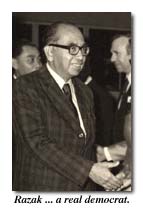|
|

|
 |

 |
24 August 1997
Malaysians - bumiputras in particular - take for granted the "feel good"
mood which prevails.
Much credit for this supposed "feel good" factor which seems as though
it will affect Malaysians for some time into the foreseeable future, must go to Prime
Minister Datuk Seri Dr Mahathir Mohamad. He has persevered, overcome obstacles (mainly
the uninspiring attitude of a section of our people), and raised and continue to
rouse, the expectations of the disadvantaged group.
Hitherto, Mahathir is the most tireless and eloquent proponent of economic progress
and everything, well almost, of what we have attained and are enjoying.

The foundation of all this was laid largely by Tun Razak, the second Prime Minister
and the "Father of Development" - first through rural development, which
won him the Magsaysay Award, and then via the New Economic Policy (NEP), which
began in 1971 and lasted for 20 years.
Razak - I can now reveal - had actually developed the idea of the NEP long before
the May 13, 1969 race riots. He always talked to me about the absolute need and he
was strongly reinforced by several aides and advisors, to make the Malaysian nation
fairer, that its people should enjoy equitable distribution of wealth and breathe
more freedom.
A school of thought within his "Kitchen Cabinet" argued that the state
must intervene meaningfully in the economy - bordering on the socialist economy of
India - whilst the unenlightened group fought to maintain the status quo.
In the end, a "mixed economy ala Malaysia" triumphed.
As Razak was fond of saying, "let us level up, not level downÓ. By this he meant,
let the economy grow rather than shrink or remain stagnant. A growing prosperity
and wealth, he argued, would be easier to distribute.
"What is there to pass on to the rakyat if the economic cake is small?"
He would ask his aides and advisors.
However, in the postrace riots and only after he took over the leadership from the
"Father of Malaysia", Tunku Abdul Rahman Putra, did he have the chance
to implement what he sincerely believed in: that only an affirmative action could
restructure the Malaysian society and nation.
He described the affirmative action simply as "restructuring a society with
the objective of giving the disadvantaged group opportunities to catch up with the
others".
When told bluntly by an outspoken aide that he should be realistic, that it was a
fantasy to attempt to achieve economic parity with the Chinese he scowled, as he
often did, and said with undisguised anger: " ... whether this is achievable
is another story and remains to be seen. It is like playing football, we must play
to win and having given out all and still lose, I will be a happy man."
|

|
|
|
|